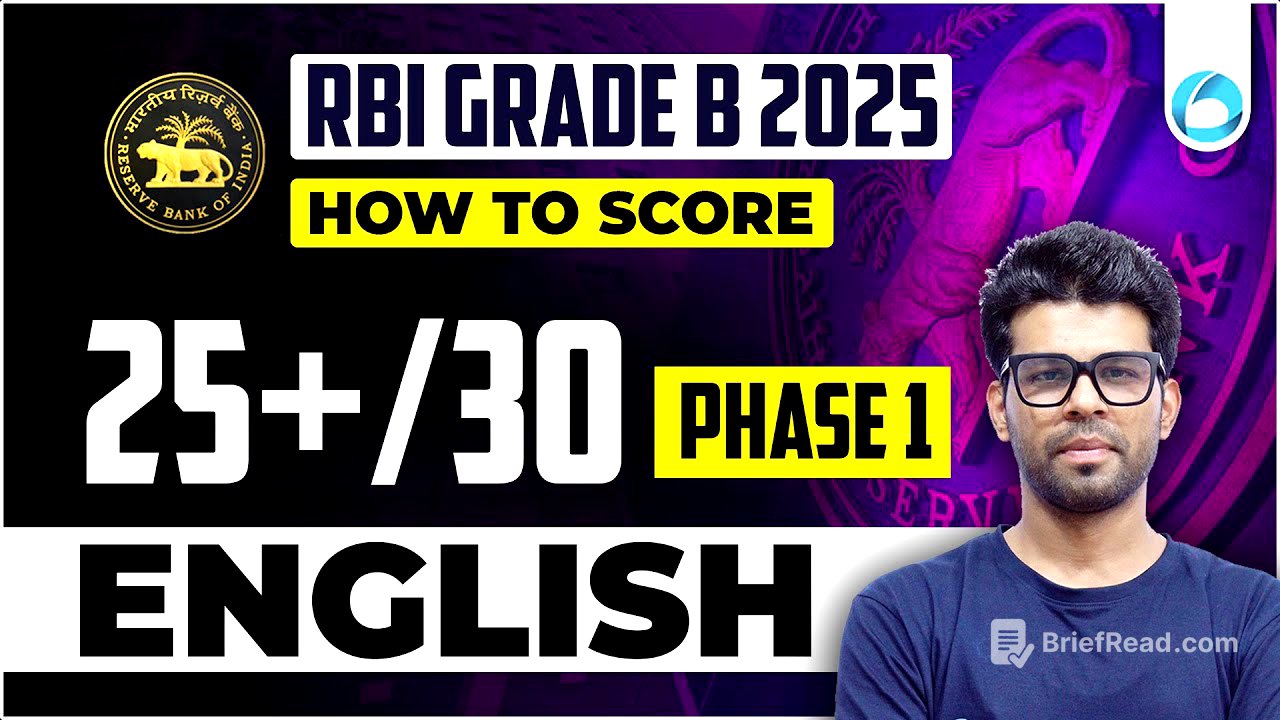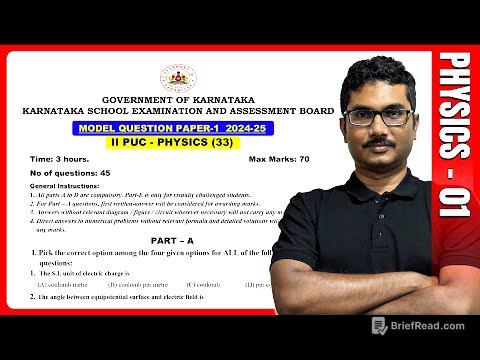TLDR;
This video provides a comprehensive strategy for scoring 25+ marks out of 30 in the English section of the RBI Grade B 2025 Phase 1 exam. It emphasizes structured preparation, consistent practice, and strategic time management. The key takeaways include focusing on grammar, vocabulary, and reading skills, using a three-step RC strategy, understanding the importance of time management, and avoiding common mistakes.
- Focus on grammar, vocabulary, and reading skills.
- Use a three-step RC strategy.
- Manage time effectively.
- Avoid common mistakes.
Introduction: Aiming for 25+ Marks in English [0:05]
The video introduces a strategy to score 25+ marks out of 30 in the English section of the RBI Grade B 2025 Phase 1 exam. It highlights that achieving this score is possible through structured preparation, consistent practice, and strategic time management. The English language section is broken down into three key components: grammar, vocabulary, and reading skills.
Exam Pattern and Question Distribution [1:48]
The English section consists of 30 questions carrying 30 marks, with a 25-minute time limit. This section is an opportunity to maximize the overall score. The exam pattern includes 8-10 questions from Reading Comprehension (RC), 3-4 grammar-based questions, error detection questions, single, double, and sometimes triple fillers, and parajumbles. Regulatory exams often include tricky parajumbles questions that require comprehensive knowledge and attention to detail. Instructions for idiom and phrase questions should be read carefully as they may ask for correct or incorrect usages. Sentence connectors and starters are based on conjunctions. Initially, aim for 20-25 correct answers to score 25+ marks.
Strategic Approach: Mastering Reading Comprehension (RC) [5:22]
RCs are game changers. A three-step RC strategy is recommended to save time: skimming the passage to identify the main idea and tone, strategically selecting direct or fact-based questions first, and then tackling inference-based questions. Verify answers within the RC to avoid ambiguity. Focus on the main idea and then minute details when needed. Look for transition words to understand the flow of the passage. Practice reading economic editorials from sources like The Hindu and The Economic Times to build context-based vocabulary.
Grammar Essentials for Scoring [8:10]
Grammar is the easiest part to finish quickly. Focus on Subject-Verb Agreement (SVA), time and tense consistency, parallel constructions, articles, and fixed prepositions relevant to regulatory standards. When spotting errors, check for modifiers, adverbs, and adjectives. Read the sentence more than once and avoid random guessing. Check for SVA, tense consistency, article errors, preposition errors, and superfluous structures.
Strategies for Tackling Parajumbles [9:35]
Parajumbles can be easy if solved strategically. Look for time frames to use chronology, full forms before short forms, and examples after hypotheses or theories. Identify opening and closing statements and look for connector words to link sentences. Use chronological order and pronoun references. Practice daily editorial reading to understand the flow of different contexts.
Fill in the Blanks: Context and Vocabulary [11:13]
Fillers are primarily vocabulary-based, but context is key. Look for contrast words like "despite." Read the entire sentence before answering to understand the context and tone. Use elimination and focus on grammar. Build context-based vocabulary rather than rote learning.
Time Management for the English Section [12:23]
Optimal time allocation is crucial. Allocate 10-12 minutes for RCs, 5 minutes for grammar-based questions, 4-5 minutes for parajumbles, and 3-4 minutes for fillers. Review and check answers if time permits. Start with questions that do not require much time, such as fillers and error spotting. Tackle RCs later and attempt difficult questions at the end. Skip a few questions if accuracy is high.
30-Day Study Plan [14:10]
A 30-day study plan includes a daily practice routine of 45-60 minutes. In the first two weeks, build a foundation by reading editorial articles and practicing grammar rules. In the third and fourth weeks, focus on topic mastery with RC passages and grammar exercises. Learn 10-50 new words daily with proper context usage. In the final week, take sectional and full-length mock tests and analyze mistakes.
Vocabulary Building Techniques [15:59]
Focus on power words for banking exams, including economic terms and advanced vocabulary. Learn 10-50 new words daily with similar and opposite words, and practice them in sentences. Revise weekly and focus on contextual usage.
Mock Test Strategy [16:42]
Follow a weekly testing schedule with topic-wise, sectional, and full-length mock tests. Analyze them to identify weak areas for focused practice. Track accuracy trends and maintain an error log. Practice time management under exam conditions.
Common Mistakes to Avoid [17:47]
Avoid reading RCs line by line, using outside knowledge, overthinking grammar questions, ignoring negative marking consequences, and poor time distribution.
Expert Tips for Maximum Score [19:58]
English can be a high-scoring section. Accuracy matters more than speed. Avoid guesswork and build strong fundamentals in grammar and vocabulary. Practice consistently, analyze mock tests, and revise grammar rules daily. Practice previous year papers under timed conditions and focus on accuracy. Stay calm and read questions carefully.
Conclusion: Achieving Success in the English Section [21:12]
With structured preparation, consistent practice, and strategic time management, scoring 25+ in English is achievable and can be a competitive advantage. Consistency is key. Start practicing today and watch scores improve. Free content is available, including PDF ebooks, PYQs, and model answers.





![How to Use Cursor PRO for Free with Claude 4.0 [August 2025]](https://wm-img.halpindev.com/p-briefread_c-10_b-10/urlb/aHR0cDovL2ltZy55b3V0dWJlLmNvbS92aS9WXzJnaFA2aVd1VS9ocWRlZmF1bHQuanBn.jpg)



